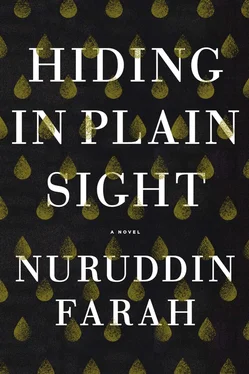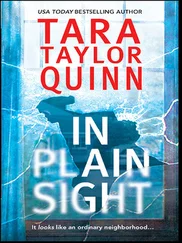To get everyone’s attention, she makes the unilateral decision to turn off the GPS. There. Silence. Then she says to Salif, “What would you say are the major formations that the East African Rift has evolved into over many tens of millions of years? I know you did a class project on that.”
Valerie says, “Now that will interest me.”
Salif becomes self-conscious and stays silent for a second. He breathes in and then out as he thinks about the answer to the question. He says, “There is the rift known as the Gregory Rift, then there is the Western or Albertine Rift. The peoples that inhabit these formations are vastly different from one another and so are the flora and fauna, as are the great gatherings of wild and not-so-wild animals found on its grasslands, each with its own particularities. The variety of landscapes are astounding, from the Afar Depression, where the land is some five hundred feet below sea level, to snow-capped mountains that reach almost to seventeen thousand feet.”
Padmini asks, “How was the rift formed?”
“Volcanic eruptions gave it its form, the same kinds of eruptions that have shaped many of the world’s iconic volcanic regions.”
“Have you been to the Serengeti, to the Mountains of the Moon? Have you seen the volcanoes there that are still emitting heat and smoke?” asks Padmini.
“Dad took us to all those places,” Salif says.
“So you know a lot about the Rift Valley?”
Salif gives them a brief rundown of facts and figures, how the valley served generations of Ethiopians from the highlands and people from the wetlands of the Sudan; and how, during the British presence in this area of Kenya, the Masai people were pushed out of their lands into reserves, the entire landmass becoming royal property, given at will by the governor of the colony to white men to do with it what they pleased.
They are nearly there. Salif guides Bella to his favorite place. Bella finds a spot with a good view. They get out of the vehicle, and young men selling touristy merchandise surround them with frightening speed. Valerie and Dahaba snap pictures of each other, then of the spectacular scenery down below. And Salif describes from memory the various features — the huge rocks down in the valley smoothed by centuries of passing water; a body of water appearing miragelike in the distance; a forest of trees so green they appear turquoise; a volcanic crater rising from the depths of the water and resembling a tiny cave; and, of course, the beautiful islets, each unto itself.
Salif doesn’t go far from the vehicle. Bella observes that Valerie and Padmini admire the knickknacks, turning them this way and that, but neither one of them purchases anything, maybe because they have no extra cash to spare.
Dahaba wants a group photograph. Everyone obliges, and they stand side by side with the vista behind them.
When they get back into the car, they fall silent, as if in awe. The valley falls away on either side of the road, which is lined by the hardwood groves the farmers use to carve their plows.
Salif says, “There are many standout spots along the way, but none is as formidable as the Rwenzori Mountains in Uganda, known to the ancient Greeks as the Mountains of the Moon, or those in the Serengeti savannah in Tanzania. And nothing is as hot or harsh as Lake Assal, in Djibouti. This is really a poor aspect of the rift’s uniqueness, even if it is breathtakingly impressive.”
“Did Aar become more religious in the last days of his life?” Bella blurts out the question unexpectedly, eliciting surprise from her listeners.
Valerie’s expression hardens, but Dahaba is venomous. “He did no such thing.”
Salif takes it easy. “Why do you ask?”
“Because I read it in a Canadian paper.”
“You’ve never told me this,” says Valerie.
“It doesn’t matter,” says Bella. “Let us drop it.”
Salif says, “I don’t think it is proper for you to say to drop it now. You’ve raised the issue and you said you saw mention of the claim that he became more Muslim toward the end of his life. Tell us what you meant so we understand.”
“His last words were words of prayer, it was reported,” Bella says. “Specifically, a verse from the Koran.”
“Well, he was culturally a Muslim,” says Salif.
“And very proud of it,” says Dahaba.
“But he wasn’t religious.”
“If anything,” Dahaba goes on, “he was spiritual.”
“He was decidedly secular,” says Bella.
“Spiritual and secular,” says Dahaba.
Salif says, “But he was respectful of other people’s faiths, just as he was of their way of life: Muslim, Christian, Jewish, Hindu, and the lot. He was a good example to all who knew him.”
Valerie is not so much ill at ease — as she was when they were talking about politics — as irritated. “How could you say that when in all the years you and I knew him we never saw him enter a mosque and pray?”
Padmini says, “I was born and brought up a Hindu, but I seldom go to a temple to worship. Ought I to call myself secular?”
Bella stays out of it, saying nothing. She has lost interest in the discussion, which doesn’t appear to be going anywhere. And lest she miss the upcoming turn, she switches on the GPS. Again she has everyone’s full, undivided attention when she says, “Time to take a break. What say you?”
“Is this Naivasha?” Valerie asks.
“We are close to Lake Naivasha; it’s to the left,” says Salif, “about twenty minutes’ drive from here. Let us go there. You’ll like it.”
“I like the name Naivasha,” Padmini says.
“What do you like about it?” asks Dahaba.
“It has a Sanskrit feel to it.”
“In what way?”
“Like, I don’t know, on a par with ‘nirvana.’”
Dahaba says, “Cute.”
“What does it mean in the local language?” asks Padmini.
Salif replies, “The name of the lake is Anglo corrupted, which was typical of the Brits, savaging native names by anglicizing them. The Masai word the Brits bastardized is nai’posha , which means ‘rough waters’ or some such. Now everyone including Kenyans know it by its anglicized version.”
“Nirvana means ‘extinguish,’ as in extinguish the lantern, doesn’t it, Padmini?” asks Bella.
“I am not so sure, now that you’ve asked,” confesses Padmini. “But most likely you are right.”
“There is a likeness of sound,” says Dahaba.
“Not meaning,” says Salif.
Dahaba singsongs “Naivasha” with “nirvana,” and likes what she hears.
The car is going up a hill when a truck emitting a billow of black smoke struggles up the incline and passes them, and they all shut their windows quickly until they are clear of it. Then they open them again to the welcome fresh air of the valley and Bella continues.
Cawrala tells Bella to make a left, and she does.
Dahaba says, “I can see we are in Naivasha.”
This is not quite true, but it will do. They are at a spot where they have a good view of the lake, and up and over the bridge they imagine the presence of fresh water and plenty of birdlife, not to mention several escarpments.
Bella maneuvers the vehicle around potholes. They pass a low building that looks like a local watering hole, its walls festooned with ads publicizing guitar entertainment at night for its clientele. Farther down the hill, they pass several more bars. They are happy when the nefarious odor of beer is no longer in their nostrils.
About fifty meters from the lake, Bella parks the car. She stops the engine and gets out, happy they’ve made it all the way to this place without a quarrel. They disperse in silence in different directions, some wanting to pee, and others to enjoy the view, to stretch their legs and welcome the peaceful air into their lungs.
Читать дальше












